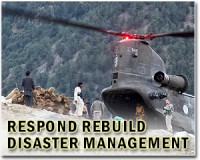 |
Port-Au-Prince (AFP) Feb 9, 2010 Doctors treating an emaciated 28-year-old Haitian man on Tuesday said they believed he survived 27 days buried in rubble after the January 12 earthquake. The man, named as Evans Monsigrace, told doctors at a University of Miami field hospital in Port-au-Prince that he had been buried by the quake while cooking rice. "Amazingly he got out after 27 days. It's amazing and we are proud to have him here," said doctor Dushyantha Jayaweera, the chief medical officer at the center. Jayaweera said his patient was stable."Today he is alert, oriented," he said, "his prognosis is very good." It was not immediately possible to verify Monsigrace's claim and there was no concrete explanation for how he survived so long if he was trapped under the rubble without access to water. Monsigrace was brought into the hospital on Monday and was treated by emergency doctors, Jayaweera said. "Yesterday around mid-day the patient was brought by his family. He was very emaciated and looked quite dehydrated," the doctor said. According to the man's mother, he was discovered by people clearing debris who then alerted Monsigrace's brothers. Jayaweera said Monsigrace was very confused, which was to be expected, but had no damage to his internal organs. "I think it tells us about people not giving up on their loved ones, they kept looking and kept hoping," the doctor said. Jayaweera said the survivor had claimed he had no access to food or water during his 27 days spent trapped. Cases of survival and rescue several days after earthquakes are not uncommon, but surviving more than 10 days without water is extraordinarily rare. The last person pulled alive from the rubble after Haiti's earthquake was 16 year-old Darlene Etienne, who spent 15 days under a collapsed building, apparently without food or water, until a rescue team pulled her out on January 27. After the rescue, Colonel Michel Orcel, one of the French military doctors treating her, said it is hard to believe that a person could survive so long without food or water. "We tried to check if she had something to drink. We sent specialists to the location, but no water was found," he said. "Her case calls into question everything we thought we knew about human physiology."
Share This Article With Planet Earth
Related Links Bringing Order To A World Of Disasters A world of storm and tempest When the Earth Quakes
 In Haiti, doctors struggle with new wave of injured
In Haiti, doctors struggle with new wave of injuredPort-Au-Prince (AFP) Feb 8, 2010 Nearly a month after an earthquake devastated Haiti, medical teams still treat trauma patients but also face a new wave of ailments linked to poor hygiene and squalid, cramped living conditions. After three sleepless nights with debilitating pain in her lower back, 53-year-old Anne Setoute waited for her turn at the Canape Vert hospital in the capital Port-au-Prince. Her house came crash ... read more |
|
| The content herein, unless otherwise known to be public domain, are Copyright 1995-2010 - SpaceDaily. AFP and UPI Wire Stories are copyright Agence France-Presse and United Press International. ESA Portal Reports are copyright European Space Agency. All NASA sourced material is public domain. Additional copyrights may apply in whole or part to other bona fide parties. Advertising does not imply endorsement,agreement or approval of any opinions, statements or information provided by SpaceDaily on any Web page published or hosted by SpaceDaily. Privacy Statement |